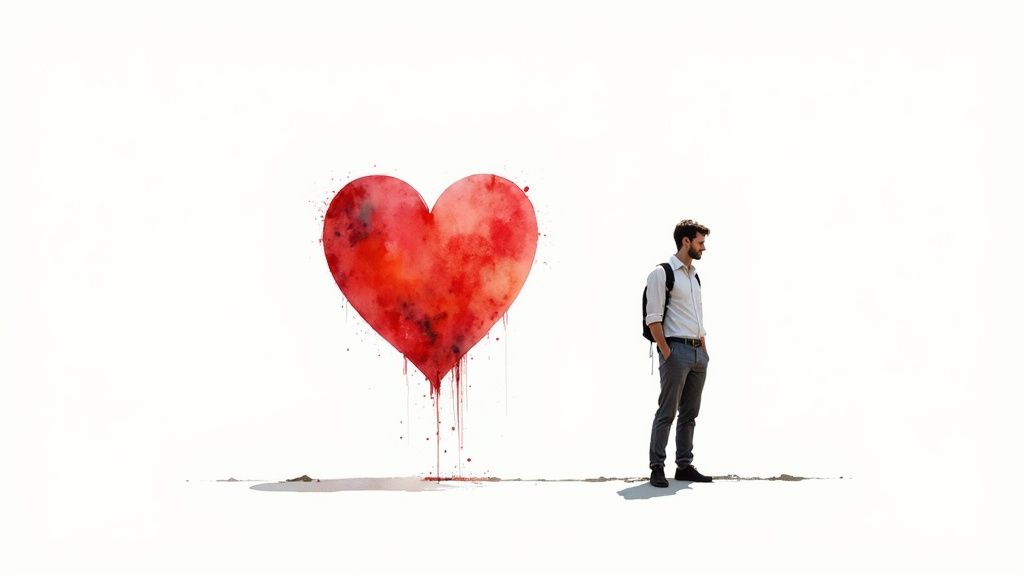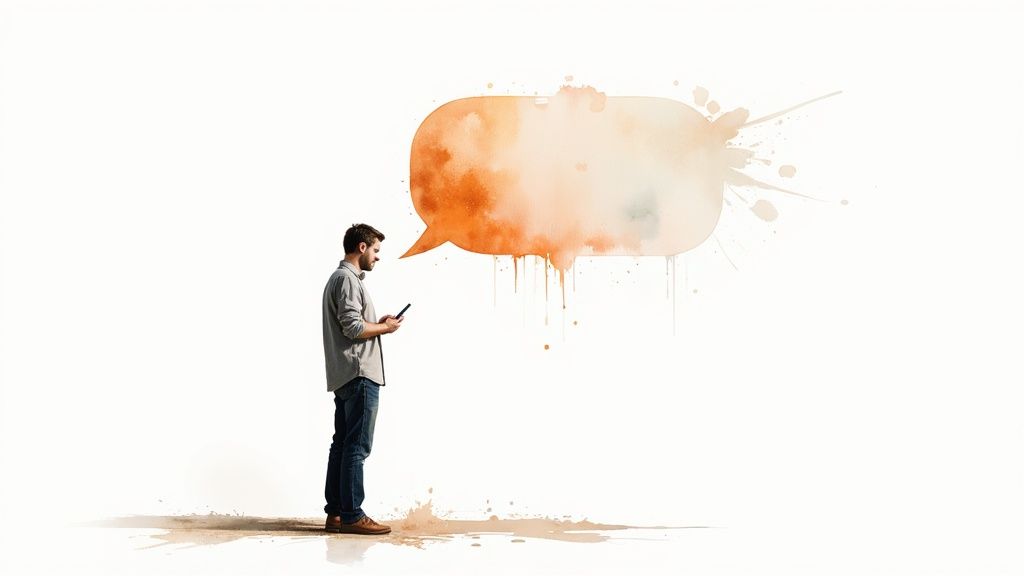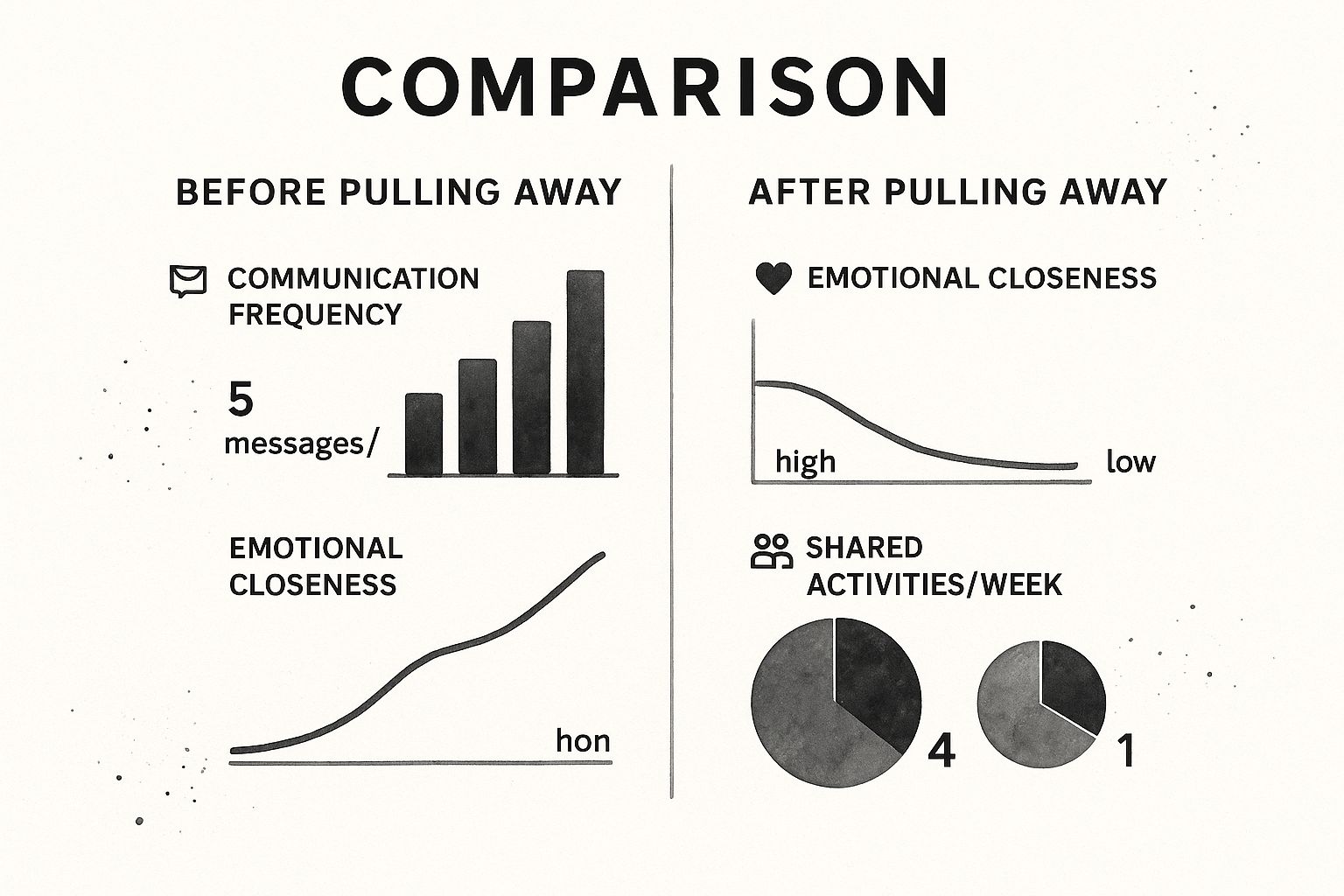When a man you’re connecting with suddenly goes cold, it's completely natural to wonder what you did wrong. But the truth is, a man pulling away is rarely about you. More often than not, it’s a sign that he's wrestling with some kind of internal pressure, stress, or a deep-seated fear of vulnerability.
His retreat is his way of hitting the pause button to process overwhelming feelings before he can move forward.
The Sudden Silence When a Man Pulls Away
It's one of the most baffling and painful experiences in dating. One minute, the connection feels electric, the texts are flying back and forth, and the future feels full of promise. The next? Nothing but silence.
This abrupt shift from constant contact to radio silence is jarring, and it can leave you questioning every single interaction. If you've ever found yourself thinking, "we went from texting every day to nothing," you know the emotional whiplash that comes with it.
This guide is here to bring some clarity to that confusion. Understanding why a man pulls away is the very first step to navigating the situation with confidence instead of anxiety. This isn't about pointing fingers or placing blame. It's about decoding a common behavior that is deeply misunderstood.
Men often withdraw not to end the relationship, but to solve a problem they don't know how to share. The silence isn't a weapon; it's a shield.
Think of his retreat as a self-preservation tactic. He might be facing pressures at work or with family that you know nothing about. Or maybe he's grappling with feelings that are moving way faster than he's comfortable with. His distance is almost always an attempt to manage his own internal world, not a rejection of you.
Before jumping to the worst-case scenario, it’s helpful to look at the common triggers behind this behavior. These aren’t excuses for poor communication, but they do offer a more compassionate and accurate lens through which to see what might be happening under the surface. Throughout this guide, we'll dive into several key factors:
- Fear of Vulnerability: How getting closer can feel incredibly overwhelming.
- External Pressures: The real impact of stress from work, finances, or family.
- Relationship Pacing: The instinctive need to pump the brakes when things get serious.
- Unresolved Personal Issues: Old wounds and past experiences that are shaping his present actions.
By getting a handle on these underlying causes, you can approach the situation with greater insight, protect your own emotional well-being, and figure out the healthiest way to respond.
To give you a clearer picture, here's a quick summary of the common triggers that can cause a man to withdraw. Seeing them laid out like this can help you identify what might be at play in your own situation.
Common Reasons Men Withdraw in Relationships
| Trigger Category | Common Manifestation | Underlying Fear or Need |
|---|---|---|
| Emotional Overwhelm | Becoming quiet, less communicative, or needing space. | Fear of vulnerability or losing control of his emotions. |
| External Stress | Distractedness, irritability, or focusing heavily on work/hobbies. | The need to solve problems alone before reconnecting. |
| Commitment Phobia | Pulling back after milestones (e.g., meeting family, saying "I love you"). | Fear of losing independence or making the wrong choice. |
| Internal Insecurity | Self-sabotaging behavior or questioning his own worthiness. | Fear of not being "good enough" for the relationship. |
This table isn't exhaustive, of course, but it covers the core reasons that show up time and time again. Recognizing these patterns is the first step toward understanding his behavior without immediately personalizing it.
The Search for Peace and Fear of Vulnerability

One of the most powerful, yet misunderstood, reasons a man pulls away is his deep-seated need for emotional peace. But let's be clear: this desire often gets tangled up with simply avoiding emotional complexity. Society has done a number on men, teaching many to see a deep, intimate connection as a source of stress, not strength.
Think of emotional vulnerability as deep-sea diving. It’s a journey into beautiful, profound territory, but it’s also seen as incredibly risky. It requires a specific set of equipment—emotional tools—that many men just don't feel they have.
This feeling of being unequipped is what triggers the retreat as a relationship gets more serious. It’s not about a lack of caring. It’s about feeling completely overwhelmed by the perceived pressure of emotional interdependence, like he's being asked to dive into the deep end without knowing how to swim.
The Misguided Equation of Peace and Detachment
For many men, "peace" becomes synonymous with a total lack of emotional turbulence. This is a critical misunderstanding that almost always leads to withdrawal. Instead of learning to ride the natural waves of a relationship, he chooses to stay on the shore, convinced it's the only way to stay calm.
This is where the fear of vulnerability really digs its heels in. Getting closer means sharing insecurities, fears, and raw, unfiltered emotions. For someone conditioned to be a "fixer" or a stoic provider, that level of openness can feel like a direct threat to his identity.
He may not even be conscious of it, but he's pulling away to protect a fragile sense of self. It can be a confusing dynamic, and you can explore more of these traits by understanding what makes someone emotionally unavailable.
Often, when he withdraws, what he’s really looking for is a personal sanctuary for peace—a space to process his own thoughts without the perceived demands of the relationship.
The Retreat from Emotional Responsibility
This search for peace through avoidance is a widespread pattern. Countless studies and commentaries show a significant number of men pulling back from dating because they equate a healthy relationship with a kind of peace that feels more like detachment than genuine involvement. For some, emotional avoidance is a way to feel less responsible for a partner’s happiness.
The core issue is that true emotional closeness creates interdependence, and with it, the potential for pain if the relationship ends. The retreat is a defense mechanism against a future hurt he already anticipates.
This dynamic explains why a man might gravitate toward partners who don't challenge his emotional walls. When he finally connects with someone who does, his instinct is to withdraw. It's a self-preservation tactic, even if it sacrifices real intimacy for the illusion of safety.
How External Pressures Can Cause Him to Retreat

It’s one of the most painful assumptions we make: when he goes quiet, it must be about us. It’s easy to spiral, thinking his distance is a red flag for the relationship.
But more often than not, a man pulling away has absolutely nothing to do with his feelings for you. It’s a direct response to overwhelming external pressures that have completely hijacked his mental and emotional bandwidth.
Think of his focus like the battery on your phone. When a massive project at work is demanding 110% of his energy, or a financial problem is keeping him up at night, there’s just not much power left for anything else. That includes emotional connection.
This isn’t him being malicious or neglectful. It's a survival mechanism. He isn't pushing you away; he's retreating into himself to tackle a problem he feels he has to solve alone.
The Provider and Fixer Instinct
From a young age, many men are conditioned to be "providers" and "fixers." A huge part of their self-worth is tangled up in their ability to solve problems, hit their goals, and feel in control of their lives. When they feel like they’re failing in one of these core areas, it can trigger a deep sense of shame or inadequacy.
Imagine a man who suddenly loses his job. The stress isn't just about money; it's a direct hit to his identity. In his mind, he has failed on a fundamental level. This is when he might retreat into a metaphorical "cave," and there are a few key reasons why:
- He wants to shield you from his stress. He doesn’t want to burden you with his anxiety or bad moods, so he creates distance as a misguided attempt to protect you.
- He needs to focus on a solution. His brain switches into single-task mode, funneling all his mental energy into fixing the problem at hand.
- He needs to hide his perceived weakness. Admitting he's struggling can feel like admitting he’s failed. He'd rather isolate himself until he has a solution and can reappear "strong" again.
This retreat isn't about you—it's about his internal struggle with his own expectations and the pressures of the world. He pulls away to fight a battle he doesn't believe he can invite you into.
His silence is often a sign that he’s working through something major. The real issue is that this coping mechanism, while making perfect sense to him, feels like a painful rejection to his partner. He thinks he’s protecting the relationship from his stress, but he doesn't realize his withdrawal is causing a completely different kind of pain.
Learning to recognize this pattern is everything. When his behavior shifts dramatically right after a known stressor—a crisis with his family, a huge setback at work, or money troubles—it’s a strong sign his distance is situational, not personal. Understanding this allows you to approach things with empathy instead of anxiety, paving a much healthier path forward for both of you.
Navigating Modern Dating and Competition
Let's be honest, today’s dating world can feel less like a quest for connection and more like a high-stakes, competitive sport. This intense environment is a huge piece of the puzzle when you're trying to figure out why a man pulls away. The constant pressure to perform, stand out, and measure up is flat-out exhausting.
Picture him scrolling through a dating app. Every single profile is a potential rival, and every match can feel disposable. This endless loop of swiping, shallow chats, and the constant risk of being ghosted leads to a very real thing called dating fatigue. It’s an emotional burnout where the effort you put into dating just doesn't feel worth the reward.
When a man hits that point, pulling away becomes a form of self-preservation. It isn't always about you or something you did. More often, it’s a defensive move to protect his self-esteem and claw back a little control in what feels like a chaotic, impersonal game.
The Pressure to Stand Out
With what feels like endless options out there, a lot of men feel like they have to project some kind of perfect image just to get a foot in the door. The pressure can be suffocating, especially in big cities or on apps where the competition is right in your face.
Many guys get frustrated, feeling like their genuine qualities are being completely overlooked in favor of superficial things like looks, job titles, or social status. This kind of environment can make a man wonder if just being himself is ever going to be enough. It’s a dynamic that contributes heavily to why some men pull away; the need to constantly 'perform' becomes incredibly draining. You can actually read more about these men's dating struggles on edwige-international.com.
Then you add digital communication to the mix. Without the benefit of body language and tone of voice, misunderstandings happen all the time, and building a real emotional connection gets that much harder.
When every interaction feels like an audition, withdrawing is a way to stop performing. It’s a man’s attempt to find solid ground when the dating world feels like quicksand.
Ultimately, stepping back can be his way of reclaiming who he is. It's about hitting pause on the game when he feels like he's losing himself in it. By creating that distance, he gives himself the space to reconnect with his own values and what he actually wants, far from the noise and pressure of the competition.
The Paradox of Feeling Lonely in a Relationship

It sounds like a total contradiction, doesn't it? One of the most common—and most confusing—reasons a man pulls away is because he feels deeply lonely inside the relationship. This isn't about physical space; you could be sharing a home, a bed, and every waking moment together.
This is about a core human need for genuine connection that feels like it's missing. Think of being at a huge, noisy party but feeling completely invisible. That's the emotional equivalent of what happens when the connection with a partner feels shallow or one-sided.
His withdrawal isn't necessarily a sign he wants to be alone. In fact, it’s often the exact opposite. It's a painful symptom that the relationship itself isn't soothing his sense of isolation, so he disengages to protect himself from feeling it more acutely.
When Connection Fails to Cure Loneliness
There's a reason loneliness has been called a public health crisis. Its effect on our mental and emotional health is massive, and that impact spills directly into our romantic lives. If a man feels like his partner doesn't truly see him, hear him, or understand what makes him tick, the relationship can start to feel more like an empty room than a sanctuary.
This sense of disconnect is a major driver of relationship breakdowns. For instance, data reveals that around 75% of couples who divorce cite a lack of commitment—a feeling that’s deeply tied to the emotional withdrawal that stems from loneliness. You can dig deeper into this trend by reading about loneliness in modern psychology on psychology.com.
When a man pulls away due to loneliness, he isn’t rejecting you. He is retreating from a connection that magnifies his feeling of being alone.
You'll often see this kind of withdrawal show up in very specific ways:
- He stops sharing: The daily updates, the worries keeping him up at night, the dreams he used to get excited about—they all stay inside.
- He seems emotionally flat: Conversations feel like they hit a wall. He might seem checked out, disengaged, or just plain apathetic.
- He creates physical distance: Suddenly, his hobbies, the gym, or nights out with friends become a much higher priority, creating a buffer between you two.
At the end of the day, he's pulling back because the relationship dynamic isn't giving him the emotional nourishment he needs. He's looking for relief from a loneliness that, paradoxically, the relationship is making worse. Getting your head around this is the first step to understanding what's really going on.
How to Respond When He Pulls Away
When a guy you’re into suddenly goes cold, your gut reaction can either help close the distance or turn a small gap into a massive canyon. It’s so tempting to chase, to demand answers, or even to make accusations. I get it. But more often than not, those reactions just end up pushing him further away, basically confirming his need for space in the first place.
The most powerful move is almost always the one that feels the most unnatural: do nothing. This isn't about giving him the silent treatment forever. It’s about creating a pocket of safety and calm, free of pressure, so he can sort through whatever is on his mind. The goal here is to handle the situation with grace and strength, not panic.
Think of his withdrawal like a sudden storm. If you run out into it demanding to know why it’s raining, you’re just going to get soaked and add to the chaos. Be the lighthouse instead—steady, calm, and a beacon of safety he can return to when the storm passes.
This shift can feel dramatic. One minute you're connected, the next there's a void. The image below really captures that jarring change in communication, closeness, and the time you spend together.

It’s a stark visual, isn't it? It shows the vibrant connection you had versus the sudden emptiness, highlighting the real emotional impact of his distance.
Give Him Space Without Disappearing
Giving him space is hands-down the most important first step you can take. It signals that you respect his need for a minute to himself and that you trust him to figure things out. This has nothing to do with playing games—it's about showing emotional maturity. He needs to know he can retreat to his "cave" without facing a dramatic confrontation when he comes out.
But giving him space doesn't mean you have to vanish completely. Your silence should feel supportive, not like a punishment. You can get this across with a single, perfectly crafted, low-pressure message.
A simple text like, "Hey, I've noticed you seem a bit distant lately. Just wanted to let you know I'm here for you if you want to talk, no pressure," is perfect.
This message works wonders because it does three things at once:
- It acknowledges the distance without pointing fingers.
- It offers support without demanding anything in return.
- It removes all pressure, putting the ball completely in his court.
After you send it, the real test begins: you have to step back and wait. Don't send a follow-up. This simple act communicates confidence and self-respect, which are incredibly attractive qualities. If you want to dive deeper into this mindset, our article on how to be high value when he pulls away has some great strategies.
Focus on Your Own Well-Being
While he's taking that space, the best thing you can possibly do is turn your focus back to yourself. Seriously. This isn't just about finding a distraction; it's a powerful move to protect your own emotional health and re-center yourself. When you start pouring all that anxious energy back into your own life, you stop waiting by the phone.
Call up your friends, lose yourself in a passion project you’ve been putting off, or just go hit the gym. When you are genuinely busy and happy in your own world, you give off a confident energy that is far more compelling than anxious waiting. You're showing him—and more importantly, reminding yourself—that your happiness doesn't hinge on his attention. And that right there is the foundation of any healthy, lasting relationship.
Navigating this situation requires a delicate balance. It's easy to fall into reactive patterns that feel right in the moment but ultimately sabotage the connection. Here’s a look at how ineffective, reactive responses stack up against more effective, proactive ones.
Effective vs Ineffective Responses to Emotional Distance
| Behavior | Ineffective Reactive Response | Effective Proactive Response |
|---|---|---|
| Communication | Sending multiple texts, demanding to know what's wrong. | Sending one supportive, no-pressure message and then waiting. |
| Focus | Obsessively checking his social media, re-reading old texts. | Shifting focus to your own hobbies, friends, and personal growth. |
| Mindset | Assuming the worst, personalizing his distance ("It's my fault"). | Understanding it's likely about him, not you, and trusting the process. |
| Boundaries | Putting your life on hold, waiting for him to come back. | Continuing to live your life fully, showing your world doesn't stop. |
| Emotional State | Acting out of anxiety, fear, or a need for immediate validation. | Responding from a place of calm, confidence, and self-respect. |
Choosing the proactive path isn't always easy, but it respects both his need for space and your own emotional well-being. It transforms a moment of potential crisis into an opportunity to demonstrate your strength and maturity, strengthening the foundation of your relationship in the long run.
Your Questions Answered
Even when you start to grasp the bigger picture, it's the specific, nagging questions that can keep you up at night. When you’re in the middle of this kind of emotional storm, you just want straight answers. Let's tackle the most common ones head-on.
Is It My Fault He Pulled Away?
Let me be crystal clear: absolutely not. In fact, his withdrawal is rarely about you personally. As we’ve talked about, men often pull away to deal with their own internal world—things like pressure at work, a deep-seated fear of getting too close, or simply needing to retreat into their own "cave" to figure things out.
His distance is almost always a reflection of his own coping mechanisms, not a verdict on you or the relationship. It’s so easy to jump to blaming yourself, but that’s a trap that only fuels your own anxiety and doesn't actually solve anything.
Will He Come Back If I Just Give Him Space?
Giving him space is hands-down the most powerful thing you can do, but it's not a magic spell with a guaranteed result. What it does do is create the absolute best conditions for him to return on his own.
When you resist the urge to chase him, you’re sending a few powerful messages. You’re showing that you respect his need for solitude and, just as importantly, that you have a full, confident life of your own. This takes all the pressure off, which is often the very thing that was pushing him away in the first place. It gives him the breathing room to actually miss you and sort through whatever he's dealing with. More often than not, that’s exactly what needs to happen for him to close the distance again.
How Long Should I Wait Before Moving On?
There's no one-size-fits-all answer here, but the guiding principle should always be your own emotional well-being. Giving him space is healthy; putting your entire life on pause indefinitely is not.
Try to set a quiet, mental timeframe that feels reasonable to you. Maybe it's a couple of weeks, maybe a little longer. But if that time passes with total radio silence and zero effort from his side, take that as the signal it is. It's time to shift the focus back to your own happiness and start taking steps to move forward.
Remember this: your goal isn't just to passively wait for him. It's to actively pour energy back into your own life. Your peace of mind is the top priority, and you deserve a partner who consistently and actively chooses to be with you.
Ultimately, understanding the "why" behind his distance is about empowering yourself. It helps you handle the situation with more grace and less panic, so you can make the healthiest possible choice for you.
Navigating the twists and turns of modern dating can feel overwhelming, but you don't have to figure it all out alone. For more expert insights and real-world strategies to build stronger, healthier connections, check out the resources at Poke Match. Find the clarity and confidence you deserve on your relationship journey by visiting poke-match.com.
